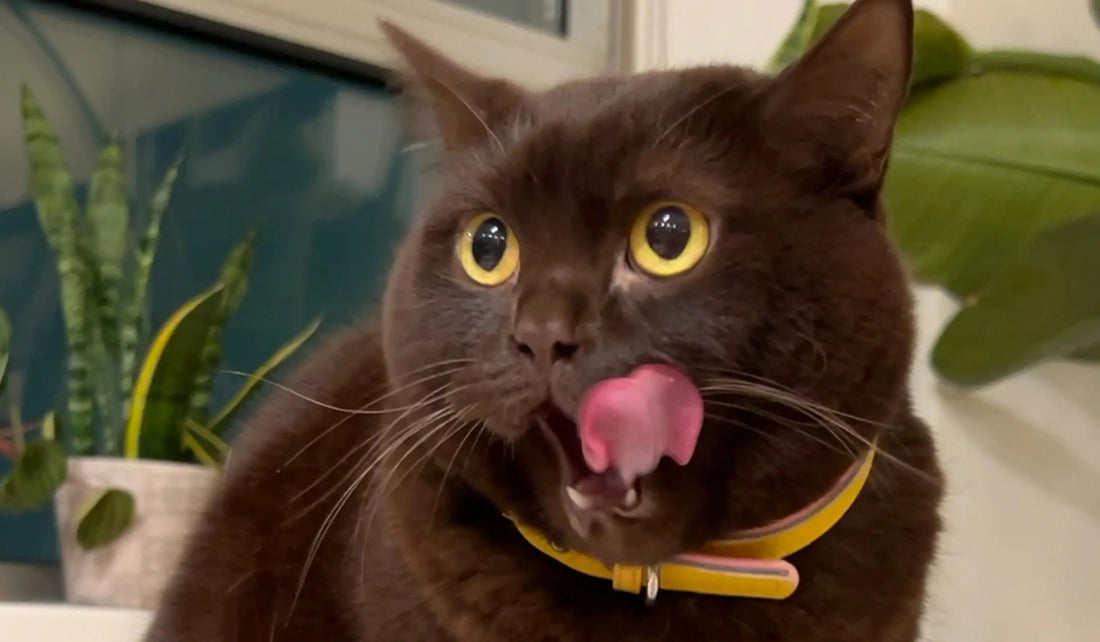
Can Cats Eat Dog Treats Safely?
It’s easy to picture dogs and cats like apples and oranges—utterly different. No comparison. But they don’t always seem to feel this way. Case in point: Your kitty nabs a few treats from your dog’s stash and seems none the worse for wear.
When this happens, however, you might feel a twinge of worry. After all, you may wonder, can cats eat dog treats? How will it affect their digestion?
Well, rest easy. While it’s not ideal for cats to regularly eat dog treats, treats formulated for both species, like those offered by Darwin’s, are perfectly safe for your cat. These treats are designed to meet the nutritional needs of both species, so there’s no need to worry when your cat enjoys them.
The Difference in Nutritional Needs Between Cats and Dogs
While both dogs and felines jones for meat-based treats, cats are obligate carnivores, meaning they:
-
Need plenty of meat
-
Don’t require carbs.
For proof, just observe your cat as they stalk mice in the garden or peer into the bushes through the window. They’re hard-wired to stalk and eat prey.
Dogs, on the other hand, can and should eat a variety of food, making them omnivores. While meat forms the backbone of their diet, they should also get plenty of grains, veggies, and even fruit.
Cat anatomies also call for specific nutrients (like taurine and Vitamin A) that aren’t as important for dogs.And because their bodies work differently, you may find yourself wondering—how many treats per day for a cat is too many? The answer depends on their weight, health, and activity level, but moderation is key.
Downsides of Giving Dog Treats to Cats
So, are cat treats okay for dogs? Given their differences, it’s best to avoid mingling your cat treats and dog treats. Every pet does best with snacks (and daily food) specifically formulated for them. Treats from Darwin’s Natural Pet Products are safe for both cats and dogs, eliminating the typical risks associated with feeding cats dog treats.
Nutritional Imbalances and Potential Health Issues
If your cat makes noshing on dog treats a habit, they may face nutritional shortfalls. Since their bodies won’t absorb much of the content, they’ll receive much less benefit than they would from cat treats.
Additionally, dog treats may contain ingredients or additives that jeopardize cats’ health. One example is propylene glycol—a moistening agent in some dog food products that can lead to health issues for cats.
The best course of action? In most cases, keep treats species-specific.
Effects of Dog Treats on Cats with Sensitive Stomachs
Since meat mostly delivers protein and fat, that’s what cat stomachs come equipped to handle. Throw lots of carbs in the mix, and your kitty may experience:
-
Nausea
-
Fatigue
-
Diarrhea
-
Appetite loss
Additionally, the extra carbs featured in dog treats can cause your cat to pack on the pounds—a big problem if your kitty already leans to the hefty side of the scale. Make sure to stick to recommended treat guidelines for the same reason.
So, chowing down on pup treats every day? Not a great habit. Try and keep your kitty focused on their own grub and eat cat treats designed just for them.
What Happens if a Cat Eats Dog Treats by Accident?
In short: Nothing much! Unless your kitty sports an exceptionally sensitive stomach, they’ll likely go about their business as usual. No need to worry.
Simply keep an eye on their behavior. If you notice any troubling signs (like vomiting or listlessness), you may want to dial up the vet.
Are There Dog Treats That Are Safe for Cats?
If you’re lucky enough to head a household featuring felines and pups, you may think, “It would sure make my life easier if I had treats that worked for cats and dogs.” You might even ask, can dogs eat cat treats without issue?
Fortunately, such treats exist. Darwin’s Natural Pet Products offers fresh cat food and treats formulated specifically for cats, and others tailored to dogs. But each treat is safe for the other. No more stress about mix-ups.
When it comes to cat-safe dog treats, Darwin’s offers:
-
Freeze-Dried Raw Chicken Hearts – Made with human-food-grade chicken hearts, these scrumptious treats come with an extended shelf life. Perfect for on-the-run treats, and totally cat-safe.
-
Freeze-Dried Raw Beef Liver Treats – Featuring nothing but bona-fide grass-fed beef liver, these treats come packed with nutrients. Fully raw when freeze-dried, they make perfect bowl toppers or training treats for cats and dogs alike.
With a stash of these freeze-dried delights on hand, rest assured that your pup will relish every bite and your feline friend can get in on the action with no trouble.
Of course, cats deserve tasty morsels of their own—like raw cat food and cat-specific treats. Darwin’s Freeze-Dried Salmon Bites come formulated for max cat appeal: fresh salmon, freeze-dried raw and loaded with the protein cats crave. And if your dog snaps up a few, no sweat—they’re suitable for both species.
Darwin’s: The Ancestral Connection
Both cats and dogs descend from hunters. While their specific nutritional needs diverge somewhat, an ancestral diet—raw, protein-rich, and additive-free—transcends the compatibility issues that come along with mass-produced pet food.
As a raw dog food pioneer, Darwin’s strives to better the health of pets everywhere. When we see pets and owners enjoying decades of joy, side-by-side, we know we’ve done our job.
Discover the next level of pet health—the kind that comes from tapping into their wild roots. Sign up for pet food delivery today!
Sources:
- UC Davis Veterinary Medicine. Role of Diet in the Health of the Feline Intestinal Tract and in Inflammatory Bowel Disease. https://ccah.vetmed.ucdavis.edu/sites/g/files/dgvnsk4586/files/inline-files/role-of-diet-feline-health-Glasgow_0.pdf
- UC Davis. American Carnivores Evolved to Avoid Each Other. https://www.ucdavis.edu/news/american-carnivores-evolved-avoid-each-other
- AAFCO. Selecting the Right Pet Food. https://www.aafco.org/consumers/understanding-pet-food/selecting-the-right-pet-food/
- Journal of the American Veterinary Medicine Association. Effects of propylene glycol-containing diets on acetaminophen-induced methemoglobinemia in cats. https://pubmed.ncbi.nlm.nih.gov/2351602/


